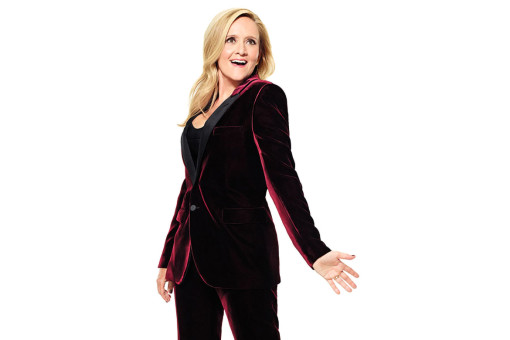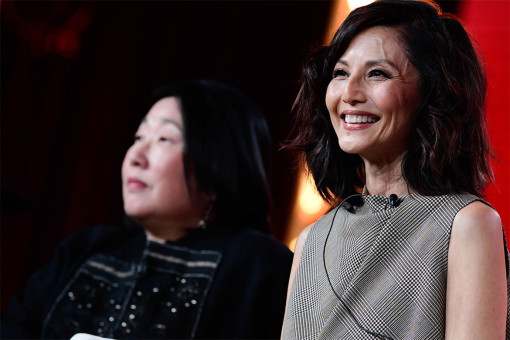Let's not forget about the Stonewall riots.
The riots - also called an uprising or rebellion - occurred 50 years ago at the Stonewall Inn, a Mafia-owned gay bar in Greenwich Village, Manhattan, after a police raid on June 28, 1969, turned violent. The demonstrations that followed helped to light a fire under the gay liberation movement in the United States.
Patti Harrison, a transgender actress and comedian, wants to remind people marking the 50th anniversary of the event that the push for LGBTQ rights isn't all rainbows and glitter.
She has produced a segment on the Stonewall riots that will air on Full Frontal with Samantha Bee at 10:30 p.m. Wednesday on TBS.
"We wanted to make a piece that spoke to the stories that don't get told as often, the credit that doesn't get given," Harrison said during a telephone interview Monday.
"As queer culture becomes more mainstream, it becomes subject to the extreme capitalistic machine that commercializes everything," she said. So, she explained, she wanted to produce a segment that puts the spotlight back on the people - particularly, she said, the community of queer women of color - who pushed back after Stonewall and fostered more acceptance of the LGBTQ community.
"My goals were, on paper, pretty clinical," Harrison said. "I said, 'let's make something really funny and kind of absurd, but let's pack it with real information that maybe some viewers of the show might not have access to.' But I didn't want to do it in a super wholesome or didactic way. That's another thing with Pride, and the commercialization of it - it tends to be portrayed as 'fluffy.' It took a lot of violent sacrifice ... to get where we are.
"It was a really warm and wonderful piece to make. I was surprised. We set out to make it silly and dark, but I ended up being genuinely moved."
Stonewall was "a very pivotal moment, a foundational moment" for the LGBTQ community, Harrison said.
Like then, protest - and a physical presence - is still vital in making voices heard, she said.
"Especially now, when we're so deeply ingrained in everything being online," she said. "It's very easy to feel that sharing a GoFundMe or a Change.org campaign is enough action. But actually showing up is more effective.
"Back then, it was more dangerous than it is now. That's something we need to be reminded of, especially within a marginalized society. Let's remind queer and trans people that they can push back. They have the right to an authentic life. They have a right to exist."
The Trump administration - which Harrison described as "wildly racist and homophobic and transphobic" - threatens to destroy the legacy of Stonewall and all the work put in by activists in the 50 years since.
Bee, contacted Monday, said Harrison's segment is fantastic.
"It's a really fun piece. I think Patti nailed it," she said. "She's brilliant."
Harrison, whose television credits include Shrill and Search Party, said filming the piece - which includes interviews with the likes of LaLa Zannell, lead organizer at the New York City Anti-Violence Project, and Judy Bowen, a transgender activist who was present in the Stonewall aftermath - was an emotional experience.
"I was very genuinely moved by the conversations that I had with people," she said. "I hope that people watch it and feel that same kind of connective warmth that I had when I shot it.
"I'm a pretty pessimistic person and I skew negative often. This ... really made me feel wonderful afterwards. I just got to talk to a bunch of people in the queer community about what Pride means to them. It was inspiring."
Harrison said it "was really, really cool that Full Frontal gave the steering wheel to me to put together a piece that is both wildly dumb and heart-warming. People will have to see for themselves, but it feels authentic to me."
Also, she said, it was great that Bee's team reached out to her, a member of the trans community, to make the segment.
"That's crucial, to let the people - whose experiences you're commenting on - steer the conversation," she said.
Bee said the issue is vital to discuss, and the Stonewall anniversary is a good stepping stone to launch that conversation.
"There's no question that LGBTQ rights are absolutely under attack with this administration," Bee said. "It's always important to remember the true history. ... How can we shape our future if we're not thinking about the past?"
There have been advances, certainly, she said - the LGBTQ community has greater visibility today, for instance, and same-sex partners now can marry. And many children - including Bee's own - are being raised to be blind to differences in gender identity.
"They're growing up in a world where those are not issues for them," she said. "It's possible to raise generations that aren't saddled with those prejudices."
On the other hand, Bee said, anti-discrimination laws are being gutted under the Trump administration - in areas as diverse as health-care protections to military service. At the same time, she said, information about gender identity and sexual orientation are being deleted from census data and government websites.
American embassies have even been forbidden to fly rainbow flags, Bee said.
"It's bananas. It's like there's an erasure being practiced, vis-a-vis our administration," she said. "It's making people feel unsafe. We still have trans men and women being beaten to death in our streets."
Despite the serious issues still facing the LGBTQ community - and the dark anniversary that's being observed this year - Bee said it's OK to celebrate Pride Month in all its glitter-filled glory.
"You still have to have fun. You can have an awesome party full of beautiful people," she said. "But carry that through the rest of the year. Have the conversation ... and don't just talk about it during Pride Month. Make it a conversation that lasts year-round."
And remember the people who got the movement started, she insisted.
"You can have it all," Bee said. "It has to be fun. It has to be splashy. It also has to be a remembrance - and a protest.
"It can't just be a supercool party. Stay mad. Be an ally. Care about it, think about it. Put your words and thoughts into action in whatever way you can."
At the same time, Harrison said, "holding space and being with your community - just being yourself - can be a form of protest."
"Lean into yourself more," she urged. "Donate to organizations that help trans and gay people. There are a lot of different ways you can celebrate and protest, to be active while ruminating and remembering what people did in the past."
Ultimately, Bee said, she thinks the United States will end up on the right track.
"My forecast is positive, I think," she said. "People are evolving. I wish they were evolving more quickly, but being an ally of the LGBTQ community is being on the right side of history. I will plant a flag on that statement right now."
To see the segment, click HERE




















